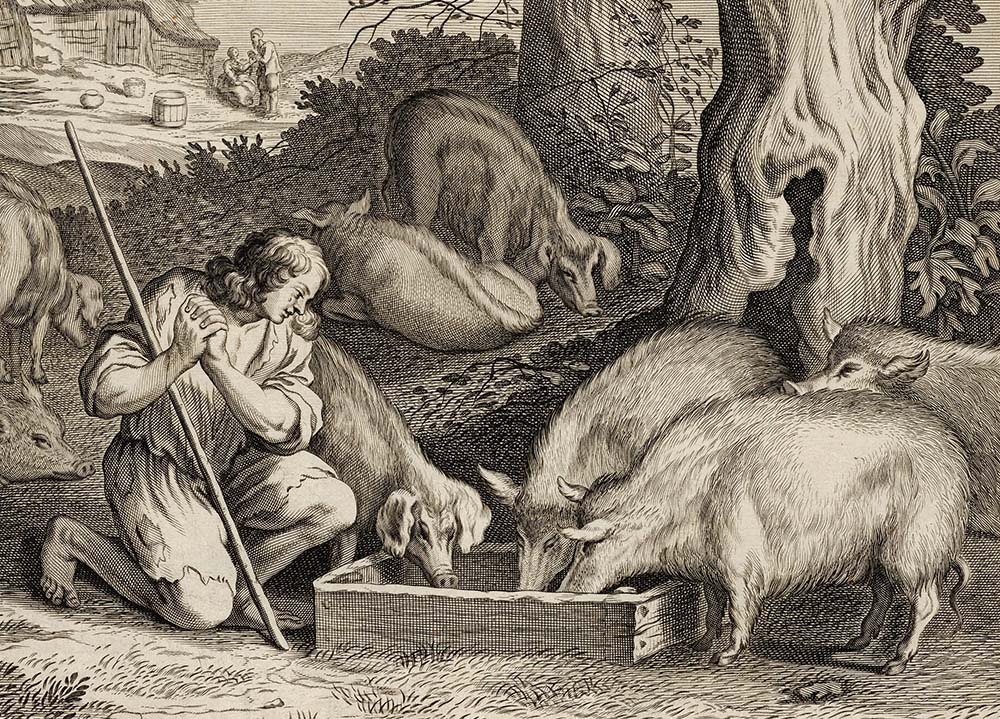
"The Prodigal Son," 17th century, by Flemish artist Pieter de Jode II (Metropolitan Museum of Art/Elisha Whittelsey Collection)
We call the story "The Prodigal Son." Some refer to it as "The Prodigal Father." Whatever the title, Jesus' Jewish companions knew that tales about siblings were classics — think of Cain and Abel, Esau and Jacob, Moses and Aaron, or Mary and Martha. Their stories all depict a divine upending of "how it's supposed to be."
Today's scene opens with some goodie-two-shoes complaining that Jesus ate with unworthy people. It probably wouldn't have bothered them had they not also eaten with him. In their religious culture, eating with someone was a sign of spiritual union. Thus, if one night Jesus ate with the local clergy and the next night with the riffraff, he was equating the two.
While both crowds might have taken that as an insult, the religious types got vocal about their disapproval.
In reply, Jesus prepped the crowd for one of his most famous stories with a couple of outlandish prequels. First, he suggested that a shepherd might leave a flock of 99 sheep to wander off the nearest cliff while he went chasing after one that had wandered away from the crowd. Then he tells the story of a woman so distraught about losing one coin that she wore down a broom and used up the oil in her lamp to search for it — and then, threw a party that surely cost more than the lost-and-found drachma. (Let yourself imagine those two scenes before you think about the next story.)
With the audience well warmed up for the clincher, Jesus opened with the line, "A man had two sons." From there, we know the story.
It's hard to imagine how the bad boy could have been worse. First, he liquidated the inheritance that was meant to allow him to raise a family and care for his father in his old age. Then, once he had squandered his future, he lowered himself to work as a farmhand — and that, not as a merely disreputable shepherd, but in the most disgusting occupation conceivable, a hog herder so hungry that he hankered to dine with the pigs.
While Luke says that he "came to his senses," big brother would probably have explained it like this: "He couldn't possibly have gone any lower, unless it was by manipulating our overly sentimental father — so, that's what he did."
We might ask ourselves why Jesus told this story to his critics. Did he think it might move them to greater understanding? Was he defending or explaining his actions? Most likely, Jesus was doing narrative theology; his story offered a counterpoint to biblical accounts depicting a God who punishes out of wrath or as discipline.
Today's reading from Exodus describes Moses as the one who acts merciful when God is ready to destroy the people. Even Hosea, who depicted God as a rejected but faithful lover, portrays God luring sinful Israel into the desert to learn from deprivation.
Advertisement
In contrast to that tradition, the father in Jesus' story expressed no wrath and imposed no disciplinary measures. He did nothing except throw a feast to celebrate his reprehensible son's return.
Jesus' life and teaching are absolutely consistent with this story. Instead of promoting penitence and sorrow as preludes to experiencing God's presence, Jesus inevitably started with celebration. When it comes to enticing people into joy with God, Jesus sees no limits. Unlike people who carefully measure out their fortunes and hold something back for a rainy day, Jesus acts as if there's no end to his treasure and rain makes it sprout all the more.
What of the recipients of such largess? They are like Paul, who we hear today telling Timothy that God approaches sinners with grace in abundance. Like the penitent woman of Luke 7:36-50, the returned son's ventures and misadventures hallowed out hitherto unexplored space in his soul that could now be filled with the love he and his father had for each other.
The son who came home really came home. In coming home, he learned that his father loved him for no good reason, and thus he could neither earn nor lose that love.
What are we to take away here? Jesus used all his storytelling arts to redraw people's image of God. Jesus' lifestyle illustrated his preaching and his table communion with any and every one faithfully reflected how God longs to relate to humanity. Jesus gives us the motley picture of the reign of God as a banquet hall populated by male and female, clergy and riffraff, ins and outs, all equally beloved.
Ultimately, that summarizes our challenge. Whichever group we belong to, Jesus tells us that God loves us and them so much that, if we believe it, we'll lose touch with the differences between us. That, according to Jesus, is how it's supposed to be.
[St. Joseph Sr. Mary M. McGlone serves on the congregational leadership team of the Sisters of St. Joseph of Carondelet.]
